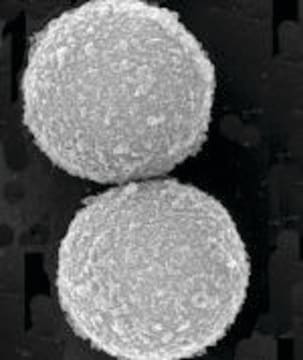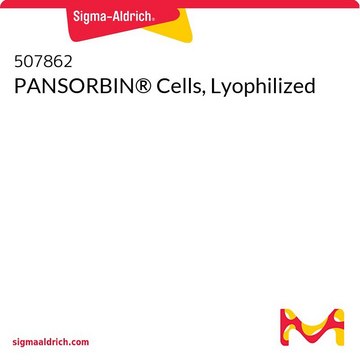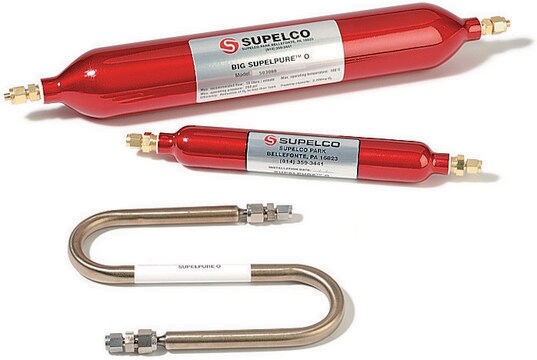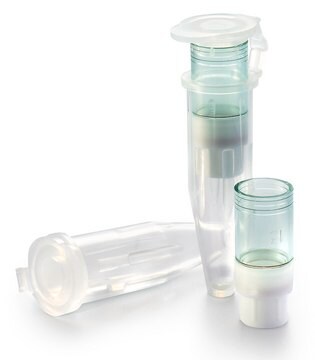507861
PANSORBIN® Cells, Standardized
Sinonimo/i:
Cell standard
Autenticatiper visualizzare i prezzi riservati alla tua organizzazione & contrattuali
About This Item
Codice UNSPSC:
41116133
NACRES:
NA.42
Prodotti consigliati
Forma fisica
liquid
Livello qualitativo
contiene
0.1% sodium azide as preservative
Produttore/marchio commerciale
Calbiochem®
Condizioni di stoccaggio
do not freeze
Capacità
≥2 mg/mL binding capacity
Condizioni di spedizione
ambient
Temperatura di conservazione
2-8°C
Descrizione generale
Heat-killed, formalin-fixed Staphylococcus aureus cells (Cowan I strain) that bear a high cell-surface density of protein A and have been pickled by the method of Kessler. Useful as a solid-phase IgG-binding reagent due to the high-affinity interaction of protein A with the Fc domain of IgG. PANSORBIN cells work best when the antibody is human (IgG1, IgG2, IgG4), rabbit IgG (all isotypes), or mouse (IgG2a, IgG2b, IgG3).
PANSORBIN Cells are heat-killed, formalin fixed Staphylococcus aureus cells that have a coat of protein A and have been pickled by the method of Kessler. Useful for mitogenic stimulation of B lymphocytes and for immunoprecipitation.
Applicazioni
Most common applications include immunoprecipitation and mitogenic stimulation of B lymphocytes.
Attenzione
Toxicity: Standard Handling (A)
Stato fisico
Supplied as a ≥10% (w/v) Staphylococcus aureus cell suspension in PBS, 0.1% sodium azide, pH 7.2.
Altre note
Kierszenbaum, F., et al. 1991. Immunology74, 317.
Meikle, P.J., et al. 1991. J. Biol. Chem.266, 22569.
Ezaki, O., et al. 1989. Biochem. Biophys. Res. Commun. 159, 1368.
Murakami, H., et al. 1988. Biochem. J.256, 917.
Kessler, S.W. 1975. J. Immunol. 115, 1617.
Meikle, P.J., et al. 1991. J. Biol. Chem.266, 22569.
Ezaki, O., et al. 1989. Biochem. Biophys. Res. Commun. 159, 1368.
Murakami, H., et al. 1988. Biochem. J.256, 917.
Kessler, S.W. 1975. J. Immunol. 115, 1617.
Note legali
CALBIOCHEM is a registered trademark of Merck KGaA, Darmstadt, Germany
PANSORBIN is a registered trademark of Merck KGaA, Darmstadt, Germany
Avvertenze
Warning
Indicazioni di pericolo
Consigli di prudenza
Classi di pericolo
Acute Tox. 4 Oral
Codice della classe di stoccaggio
12 - Non Combustible Liquids
Classe di pericolosità dell'acqua (WGK)
WGK 3
Punto d’infiammabilità (°F)
Not applicable
Punto d’infiammabilità (°C)
Not applicable
Certificati d'analisi (COA)
Cerca il Certificati d'analisi (COA) digitando il numero di lotto/batch corrispondente. I numeri di lotto o di batch sono stampati sull'etichetta dei prodotti dopo la parola ‘Lotto’ o ‘Batch’.
Possiedi già questo prodotto?
I documenti relativi ai prodotti acquistati recentemente sono disponibili nell’Archivio dei documenti.
Menaka D Hapugoda et al.
Clinical and vaccine immunology : CVI, 14(11), 1505-1514 (2007-09-28)
The resurgence of dengue (DEN) virus infections in the last few decades coupled with the lack of a preventive vaccine and specific antiviral drugs has jointly contributed to making this a significant global public health problem. Currently, symptomatic supportive treatment
Use of recombinant vaccinia virus vectors for cell biology.
O A Weisz et al.
Methods in cell biology, 43 Pt A, 137-159 (1994-01-01)
Peifang Sun et al.
Methods in molecular biology (Clifton, N.J.), 1808, 187-196 (2018-06-30)
Dengue envelope (E) protein is a dominant antigen for vaccine development and E-based vaccines have shown partial or full protection against live-virus challenge in non-human primates. Generally, T cell responses can be investigated with peptides. However, hundreds of over-lapping peptides
K E Reed et al.
Methods in molecular medicine, 19, 331-342 (1999-01-01)
Heterologous expression systems have been widely used to study hepatitis C virus (HCV) proteins in lieu of an efficient method for establishing HCV infections in cell culture. Studies of HCV polyprotein processing in both mammalian-cell-based and cell-free expression systems have
Maria Forlenza et al.
Journal of immunology (Baltimore, Md. : 1950), 183(8), 5319-5332 (2009-09-30)
Functional characterization of TNF-alpha in species other than mammalian vertebrates is limited, and TNF-alpha has been studied in a limited number of fish species, primarily in vitro using recombinant proteins. Studies on TNF-alpha from different fish species so far pointed
Il team dei nostri ricercatori vanta grande esperienza in tutte le aree della ricerca quali Life Science, scienza dei materiali, sintesi chimica, cromatografia, discipline analitiche, ecc..
Contatta l'Assistenza Tecnica.








